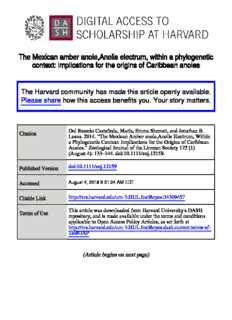Table Of ContentThe Mexican amber anole,Anolis electrum, within a
phylogenetic context: implications for the origins of
Caribbean anoles
Citation
Del Rosario Castañeda, María, Emma Sherratt, and Jonathan B. Losos. 2014. “The Mexican
Amber anole,Anolis Electrum, Within a Phylogenetic Context: Implications for the Origins
of Caribbean Anoles.” Zoological Journal of the Linnean Society 172 (1) (August 4): 133–144.
doi:10.1111/zoj.12159.
Published Version
doi:10.1111/zoj.12159
Permanent link
http://nrs.harvard.edu/urn-3:HUL.InstRepos:34309457
Terms of Use
This article was downloaded from Harvard University’s DASH repository, and is made available
under the terms and conditions applicable to Open Access Policy Articles, as set forth at http://
nrs.harvard.edu/urn-3:HUL.InstRepos:dash.current.terms-of-use#OAP
Share Your Story
The Harvard community has made this article openly available.
Please share how this access benefits you. Submit a story .
Accessibility
Title:'The'Mexican'amber'anole,'Anolis'electrum,'within'a'phylogenetic'context:''
implications'for'Caribbean'anoles'origins'
'
'
'
María'del'Rosario'Castañeda1,'Emma'Sherratt1,'and'Jonathan'B.'Losos1'
'
1"Department)of)Organismic)and)Evolutionary)Biology)and)Museum)of)Comparative)Zoology,)
Harvard)University,)26)Oxford)Street,)Cambridge,)MA)02138,)USA"
'
'
'
'
Corresponding'author:''María"del"Rosario"Castañeda'
Department)of)Organismic)and)Evolutionary)Biology)and)Museum)of)Comparative)Zoology,)
Harvard)University,)26)Oxford)Street,)Cambridge,)MA)02138,)USA)
Phone:'(1)"617949699099"
Fax:"(1)"617949595667"
Email:"[email protected]"
"
"
Running'title:'Anolis)electrum,"the"Mexican"amber"lizard"
ABSTRACT'
Anoles"are"well"known"examples"of"adaptive"radiation"and"convergent"evolution."Their"
phylogenetic"relationships"have"been"intensely"studied,"but"their"fossil"record"remains"
fairly"poor,"limiting"understanding"of"their"evolutionary"history."We"present"new"data"on"
Anolis)electrum,)the"first"discovered"fossil"anole"and"sole"vertebrate"described"from"
Mexican"amber,"using"x9ray"Computed"Tomography."We"inferred"the"phylogenetic"
relationships"of"A.)electrum"and)comment"on"its"use"in"estimating"the"age"of"Anolis)origins,"
which"has"significant"relevance"in"explaining"the"presence"of"anoles"on"Caribbean"islands."
Anolis)electrum"is"represented"by"two"pieces"of"amber"containing"parts"of"the"same"
individual."Partial"squamation"and"skeleton"details"are"well"preserved,"though"only"ten"
characters"commonly"used"in"phylogenetic"analyses"could"be"scored."The"lack"of"
informative"characters"resulted"in"A.)electrum)being"inferred"in"14"different"places"within"
four"recognized"subclades:"Dactyloa,"cristatellus)series,"darlingtoni)series,"and"Norops,"one"
of"which"corresponds"to"previously"suggested"close"relationships."Results"fail"to"support"a"
suggested"age"estimation"of"130"Myr"for"Anolis;"consequently,"the"hypothesis"of"overwater"
dispersal"as"the"explanation"for"the"occurrence"of"anoles"on"Caribbean"islands"remains"the"
most"robust"hypothesis.""
"
"
Keywords:'Anolis)electrum,)Mexican"amber,"phylogenetics,"x9ray"computed"tomography."
INTRODUCTION'
With"close"to"400"species"currently"recognised"and"extensive"morphological,"ecological"and"
behavioural"diversity,"Anolis"lizards"have"become"a"textbook"example"of"adaptive"radiation"
and"convergent"evolution."Although"significant"progress"has"been"achieved"in"the"
reconstruction"of"their"phylogenetic"relationships"(Jackman"et"al.,"1999;"Nicholson,"2002;"
Poe,"2004;"Castañeda"&"de"Queiroz,"2013),"understanding"of"the"evolutionary"history"of"
Anolis)is"constrained"by"the"small"number"of"fossils"available."Indeed,"other"than"very"
recent"late"Pleistocene/Holocene"fossils"(Etheridge,"1965,"1966;"Steadman,"Pregill"&"Olson,"
1984;"Roughgarden"&"Pacala,"1989;"Chun,"2007),"the"published"fossil"record"is"limited"to"
four"specimens"preserved"in"amber"(Lazell"Jr.,"1965;"Rieppel,"1980;"de"Queiroz,"Chu"&"
Losos,"1998;"Polcyn"et"al.,"2002)."Three"of"these"are"from"early9to9middle"Miocene"deposits"
in"the"Dominican"Republic"(Iturralde9Vinent"&"MacPhee,"1996;"Iturralde9Vinent,"2001),"all"
of"which"appear"to"be"members"of"the"chlorocyanus)clade"(or"species"group)"extant"on"
Hispaniola"today"(de"Queiroz"et"al.,"1998;"Polcyn"et"al.,"2002)."
"
The"fourth"amber"fossil,"and"the"first"described,"comes"from"the"mines"around"Simojovel,"
Chiapas,"where"most"Mexican"amber"originates"(Poinar"Jr."&"Brown,"2002;"Solórzano"
Kraemer,"2007)."The"age"of"Mexican"amber"is"still"under"debate."It"is"well"accepted"that"
Simojovel"deposits"occur"in"three"lithostratigraphic"units,"La"Quinta"Formation,"the"
Mazantic"shale"and"the"Balumtun"sandstone,"but"disagreement"lingers"on"whether"these"
formations"are"late"Oligocene"to"early"Miocene"in"age"(22.5926"Myr;"Langenheim,"1966;"
Poinar"Jr.,"1992;"Poinar"Jr."&"Brown,"2002),"or"as"young"as"early"to"mid9Miocene"(15920"
Myr)"and"probably"contemporaneous"with"the"Dominican"amber"(Solórzano"Kraemer,"
2007,"2010)."The"Mexican"anole"fossil"was"described"as"Anolis)electrum)by"Lazell"in"1965"
(Lazell"Jr.,"1965)."In"those"pre9cladistic"days,"Lazell"(1965)"suggested"several"possible"close"
relationships"for"A.)electrum)based"on"overall"morphological"similarity"to"extant"taxa"and"
biogeography."After"examining"a"series"of"potential"candidate"species,"Lazell"(1965)"
determined"that"four"species"most"closely"agreed"with"the"combination"of"characters"found"
in"A.)electrum:"A.)chloris,)A.)fuscoauratus,)A.)limifrons)and"A.)maculiventris."Ultimately,"he"
concluded"that"A.)electrum)most"likely"was"closely"related"to"A.)limifrons"because"it"is"the"
most"morphologically"similar"species"known"to"occur"in"the"same"area"today."Although"
interest"in"anole"evolution,"phylogeny,"and"biogeography"has"thrived"since"then,"A.)electrum)
has"not"been"re9examined"nor"included"in"explicit"phylogenetic"analyses."This"is"somewhat"
surprising"given"that,"in"theory,"A.)electrum"could"provide"important"insights"into"
controversies"over"Central"American"anole"biogeography"(Nicholson,"2005)"as"well"as"
issues"concerning"anole"evolutionary"history"(Pinto"et"al.,"2008;"Schaad"&"Poe,"2010)."
"
After"47"years"of"obscurity"for"Anolis)electrum,"the"need"of"a"re9evaluation"of"its"
phylogenetic"position"emerged"from"Nicholson"et"al.’s"(2012)"controversial"revision"of"
anole"history."Based"on"an"analysis"of"phylogenetic"data,"Nicholson"et"al."(2012)"proposed"
that"anoles"originated"130"Myr"and"that"extant"taxa"began"to"diverge"95"Myr."This"estimate"
is"substantially"older"than"both"recent"estimates"based"on"DNA"data"that"place"the"stem"age"
of"the"Anolis)clade"at"23975"Myr"(Mulcahy"et"al.,"2012),"53972"Myr"(Townsend"et"al.,"2011),"
or"81983"Myr"(Mulcahy"et"al.,"2012;"Pyron"&"Burbrink,"2013),"as"well"as"previous"estimates"
based"on"albumin"divergence"and"early"molecular"clock"methods,"which"place"the"
diversification"of"extant"taxa"(crown"clade"age)"at"40"and"66"Myr,"respectively"(Shochat"&"
Dessauer,"1981;"reviewed"in"Losos,"2009)."Nicholson"et"al.’s"(2012)"much"older"date"of"
Anolis"divergence"is"significant"because"it"supports"the"hypothesis"that"the"presence"of"
anoles"on"Caribbean"islands"is"the"result"of"vicariance"rather"than"overwater"dispersal,"a"
scenario"that"is"incompatible"with"the"younger"dates"for"anole"divergence."Examination"of"
Nicholson"et"al.’s"(2012)"dating"analysis"indicates"that"their"proposed"older"date"is"mainly"
due"to"the"position"of"A.)electrum)used"for"fossil"calibration"(the"other"calibration"point,"
based"on"Dominican"fossils,"is"considered"in"the"Discussion)"and"to"a"lesser"extent"its"
assigned"age."Following"Lazell"(1965),"Nicholson"et"al."(2012)"placed"A.)electrum)as"sister"
taxon"to"the"recently"diverged"clade"of"A.)limifrons"and"A.)zeus)(the"latter"taxon"being"
recently"split"off"from"the"former"based"on"differences"in"scalation"and"male"dewlap"
coloration;"Köhler"&"McCranie,"2001)."They"also"dated"the"divergence"between"A.)electrum)
and"A.)limifrons)+"A.)zeus"at"28"Myr"based"on"an"age"estimate"of"Mexican"amber"that"is"
older—and"potentially"much"older—than"current"estimates"(Langenheim,"1966;"Poinar"Jr.,"
1992;"Langenheim,"2003;"Solórzano"Kraemer,"2007,"2010)."The"combination"of"the"
phylogenetic"placement"of"A.)electrum)and"the"assigned"age"of"Mexican"amber"resulted"in"
Nicholson"et"al."(2012)"arriving"at"a"very"ancient"age"for"anole"origins."Given"this"surprising"
conclusion,"we"decided"to"re9examine"A.)electrum"to"attempt"to"determine"its"phylogenetic"
position."We"provide"new"data"on"this"important"and"little9known"specimen"using"modern"
tools"not"available"to"Lazell"(1965)"a"half9century"ago."We"further"use"topology"tests"to"
explicitly"evaluate"the"relationship"between"A.)electrum)and"its"potential"close"relatives"
proposed"by"Lazell"(1965;"i.e.,"A.)chloris,)A.)fuscoauratus,"A.)limifrons)and"A.)maculiventris)."
"
MATERIALS'AND'METHODS'
Data'collection'
Anolis)electrum"is"composed"of"two"amber"pieces"(holotype:"UCMP"68496,"paratype:"UCMP"
68497)"assumed"to"contain"posterior"and"anterior"portions"of"the"same"individual,"
respectively."The"reported"type"locality"is"Simojovel,"Chiapas,"though"more"precise"
information"is"not"available"(Lazell"Jr.,"1965)."External"morphology"was"examined"using"a"
dissecting"microscope."Photographs"of"the"fossils"were"taken"using"a"digital"camera"(JVC"
KY9F7SU"3"chip"Digital"CCD"Microscopy"Camera)"attached"to"a"dissecting"microscope"(Leica"
MZ12 "with"a"0.5x"lens),"linked"to"a"computer"with"the"software"Auto9Montage"(Synoptics,"
5
Ltd.)."Auto9Montage"integrates"a"series"of"images"taken"at"different"focal"planes"to"produce"
an"image"with"extended"depth"of"field."For"further"examination,"we"used"High9Resolution"
X9ray"Computed"Tomography"(HRXCT),"which"uses"a"series"of"radiographs"to"build"a"3D"
representation"of"the"specimen."The"two"fossils"were"scanned"using"a"Nikon"(Metris)"X9Tek"
HMXST"225"machine"housed"at"Harvard"University’s"Centre"for"Nanoscale"Systems."Both"
specimens"were"scanned"with"a"molybdenum"target,"55"kV,"200"µA,"1000"ms"exposure,"0.1°"
rotation"step,"and"no"filter."The"reconstructed"voxel"size"of"UCMP"68496"is"0.010"mm"and"
UCMP"68497"is"0.014"mm."HRXCT"scans"of"each"specimen"are"stored"as"a"series"(stack)"of"
TIFF"images"at"Harvard"University"Museum"of"Comparative"Zoology;"raw"CT"slice"data"
available"on"request,"reconstructed"images"available"on"Morphobank"(O'Leary"&"Kaufman,"
2012;"http://morphobank.org/permalink/?P1108)."Post9processing"of"the"scan"data"was"
done"using"VGStudio"MAX"v2.2"(Volume"Graphics,"2001)."The"different"elements"in"the"
fossil"(e.g."bone,"amber,"air)"are"represented"in"each"slice"by"voxels"of"different"grey"values,"
white"being"the"most"dense"(i.e.,"bone)"and"black"the"least"dense"(i.e.,"air)."The"slices"were"
segmented"by"applying"a"threshold"(using"the"half9maximum"height"protocol;"Spoor,"
Zonneveld"&"Macho,"1993)"to"retain"white"voxels"to"represent"bone,"and"black"voxels"to"
represent"air9filled"voids."When"stacked,"the"thresholded"slices"produce"a"volumetric"
representation"of"the"specimen,"which"we"used"for"anatomical"inspection."HRXCT"allows"
the"fossils"to"be"more"thoroughly"examined,"and"with"greater"resolution"than"was"
previously"possible.""
'
Phylogenetic'analyses"
We"scored"as"many"morphological"characters"as"possible"following"Poe’s"(2004)"character"
descriptions."These"data"were"combined"with"a"dataset"comprised"of"morphological"(Poe,"
2004),"and"molecular"data"(mitochondrial"genes"ND2,"5"transfer9RNAs"[tRNATrp,"tRNAAla,"
tRNAAsn,"tRNACys,"tRNATyr],"and"the"origin"for"light9strand"replication"[O ];"Macey"et"al.,"
L
1997;"Jackman"et"al.,"1999;"Creer"et"al.,"2001;"Jackman"et"al.,"2002;"Glor"et"al.,"2003;"
Harmon"et"al.,"2003;"Schulte"II,"Valladares"&"Larson,"2003;"Nicholson"et"al.,"2005;"
Nicholson,"Mijares9Urrutia"&"Larson,"2006;"Castiglia"et"al.,"2010;"Castañeda"&"de"Queiroz,"
2011)."The"complete"data"matrix"is"available"in"Morphobank"
(http://morphobank.org/permalink/?P1108)."Although"other"molecular"markers"are"
available"for"anoles"(e.g.,"nuclear"RAG1,"mitochondrial"cytKb),"we"focused"on"the"ND2"gene"
and"five"adjacent"tRNAs,"because"this"mitochondrial"region"is"the"one"with"the"broadest"
taxonomic"coverage"in"anoles,"which"prevented"unnecessary"missing"data"added"to"the"
dataset."DNA"sequences"were"aligned"using"Clustal"X"(Thompson"et"al.,"1997)"under"default"
settings,"and"translated"into"amino"acids"using"MacClade"v.4.07"(Maddison"&"Maddison,"
2001)"to"confirm"the"correct"translation"frame."Sequences"coding"tRNAs"were"aligned"
manually,"following"Kumazawa"and"Nishida’s"(1993)"model"of"tRNA"secondary"structure."
The"resulting"matrix"included"91"morphological"characters"and"1474"DNA"bases"for"182"
taxa,"including"seven"non9Anolis)outgroup"species."
"
The"phylogenetic"relationships"of"Anolis)electrum)were"estimated"in"PAUP*"v."4.0b10"
(Swofford,"2002)"using"parsimony"methods."We"used"equal"costs"for"state"transformations,"
except"for"multistate"ordered"morphological"characters,"which"were"weighted"such"that"the"
range"of"each"character"equals"1."A"heuristic"search"with"2000"replicates"of"random"
stepwise"addition"was"performed,"with"all"other"settings"left"as"default."Nodal"support"was"
assessed"using"non9parametric"bootstrap"resampling"(Felsenstein,"1985)"using"100"
bootstrap"pseudoreplicates"and"heuristic"searches"with"50"replicates"of"random"stepwise"
addition"(other"settings"left"as"default)"for"each"bootstrap"replicate.""
"
Hypothesis'testing'
We"used"topology"tests"to"explicitly"evaluate"if"the"hypotheses"of"Anolis)electrum)as"sister"
taxon"to"A.)chloris)(Dactyloa"clade),)A.)fuscoauratus,)A.)limifrons)or"A.)maculiventris"(Norops"
clade)"are"supported"by"the"data."We"performed"four"parsimony"analyses"(using"the"same"
settings"as"above),"each"incorporating"one"of"the"alternative"hypotheses"of"sister"
relationship"with"A.)electrum)as"a"topological"constraint."Each"constrained"topology"was"
constructed"using"MacClade"(Maddison"&"Maddison,"2001),"and"imported"into"PAUP*"as"a"
topological"constraint."To"test"if"each"resulting"optimal"tree"of"the"constrained"analysis"was"
significantly"different"from"the"optimal"tree"of"the"unconstrained"analysis,"we"performed"
Wilcoxon"signed9rank"tests"(Templeton,"1983)"as"two9tailed"tests"in"PAUP*.""
'
RESULTS"
Morphology'of'Anolis'electrum""
During"the"fossilisation"process"of"amber,"organic"material"fully"surrounded"by"the"resin"is"
preserved"with"remarkable"detail."For"vertebrate"inclusions,"the"soft"tissue,"although"
apparently"visible"through"the"translucent"amber,"has"actually"rotted"away,"leaving"an"air9
filled"void"lined"by"an"impression"of"the"skin."The"skeletal"elements"are"often"preserved"
(particularly"the"limbs);"they"can"remain"in"place,"or"may"become"disarticulated"and"free"to"
move"around"inside"the"void.""In"both"specimens,"the"lizard"is"surrounded"by"a"reddish"halo"
caused"by"mineralisation"of"the"soft"tissue"that"occurs"when"the"amber"is"fractured"and"the"
organic"matter"comes"into"contact"with"air."From"the"HRXCT"scans,"we"found"the"
mineralised"skin"has"a"similar"X9ray"attenuation"to"the"bone,"obscuring"the"natural"margin"
between"the"two"materials."The"HRXCT"scans"also"revealed"that"there"are"few"skeletal"
elements"preserved"in"the"holotype"and"paratype"specimens,"but"the"outline"of"the"air9filled"
voids"retain"remarkable"details"of"the"soft"tissue"(Figs."192;"Supplementary"material"S1,"S2,"
videos"192)."Considering"the"anatomical"parts"preserved"in"each"specimen,"and"the"
dimensions"of"the"limbs"in"each,"we"agree"with"Lazell’s"(1965)"conclusion"that"these"are"
two"halves"of"the"same"animal."The"following"specimen"descriptions"are"based"primarily"on"
CT"scan"reconstructions"and"serve"as"a"complement"to"the"detailed"scale"information"
provided"by"Lazell"(1965)."'"
"
Holotype'(UCMP'68496,'Fig.'1,'S1).'This"specimen"includes"the"right"hindlimb,"a"left"
hindtoe,"and"a"portion"of"the"body."The"ventral"aspect"of"the"hindlimb"and"posterior"portion"
of"the"body"lie"against"the"underside"of"the"amber"block"(Fig."1B,"S1)."The"only"skeletal"
Description:Running'title:'Anolis)electrum,"the"Mexican"amber"lizard" Anolis)electrum"is"represented"by"two"pieces"of"amber"containing"parts"of"the"same".

